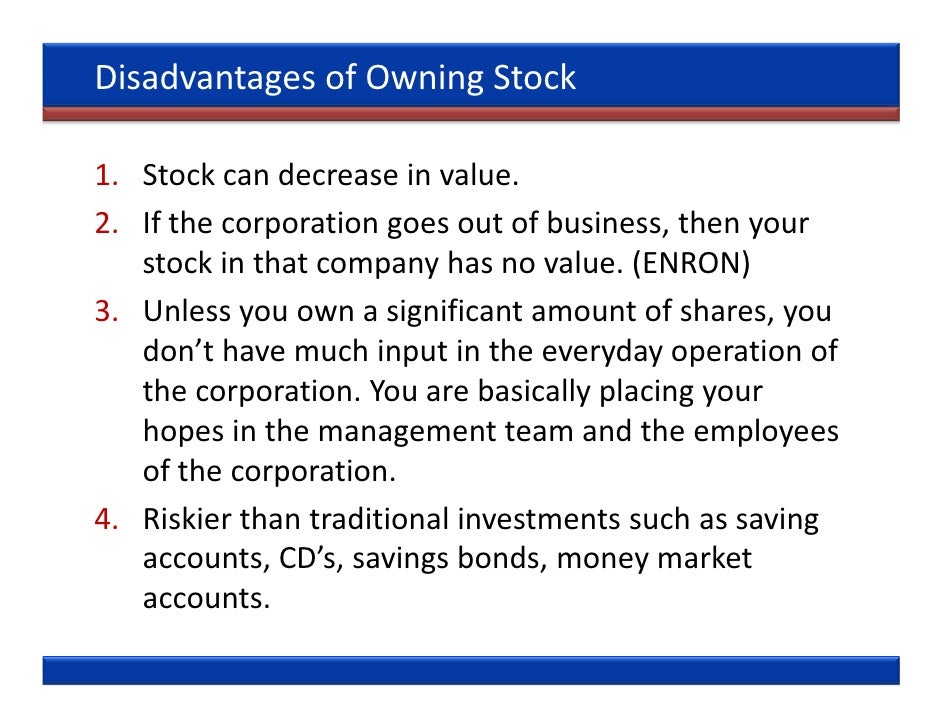
05/01/ · Disadvantages of holding stocks. Tying up cash flow- the more inventory you have on stock, the greater amount of business capital is hold up, too. There is a possibility of slower business cash flow. Obsolete inventory- the longer you keep a product, the lesser the quality and value it offers. Item not sold- because of keeping stock on hand 29/12/ · The reasons for excess inventory usually include poor forecasting and purchasing e.g you’ve over-projected your demand and/or bought too much of the wrong items. If demand for those items then hits zero for a prolonged period of time, the result is obsolete stock. Again, obsolete stock is bad news for blogger.comted Reading Time: 6 mins For some, carrying too much stock may seem like a good problem to have. Even though stock represents the potential for future profits, carrying too much stock will cause your business to incur some serious, costly and unnecessary expenses. For one, carrying too much stock forces you to take up valuable storage space, and that storage space isn
The pros and cons of holding stocks - Australian Seller
Home » Grow your Business ». One of the principles of supplying goods to a market is that the company must hold enough stock to satisfy customer demand without holding too much. Holding just the right quantity of stocks to disadvantages of holding too much stock demand will help to minimize cost. Inventory is the physical stock of item that a business or an organization keeps at hand for efficient running of its affairs. Inventory management on the other hand involves the supervision of non-capitalized assets and stock items.
It sees to the flow of goods from manufacturers to the warehouse and from these facilities to the point of sale. In addition, inventory management can also be seen as maintaining an effective internal control over inventory including safeguarding the inventory from damage or theft, using purchase order to track inventory movement, maintaining an inventory ledger and frequently comparing physical inventory counts with the amount that is on record.
The inventory that a company holds can be one of its most valuable assets or even a liability. In most inventory intensive businesses, a shortage of supply of inventory can present a lot of undesirable effects for the company. On the other hand, having more inventory at hand than needed can result in spoilage, theft, damage or even decline in demand.
In this case, inventory can be said to be a liability to the business in question if not in the accounting sense, disadvantages of holding too much stock. The system works in a circular process from purchase tracking to inventory management and to re-ordering and back around again, disadvantages of holding too much stock.
Inventory can and should be insured and in the event that it is not sold off in time, it may have to be disposed of at clearance price or gotten rid of. Bearing this in mind, it is clear that inventory management is very important for businesses. Knowing the right time to restock certain items, how many of such items to produce or buy, how much to pay, when to sell and at what price can become difficult choices to make without the right information.
Given the significant costs and benefits that is associated with inventories, companies disadvantages of holding too much stock a lot time trying of find out what constitutes the optimal level of inventory that should be maintained at all times so as not to have too much or too little of stock at any point in time. If you enter into a warehouse or a facility without proper inventory management, it is immediately apparent.
Managers and business owners who do not implement an effective inventory management system usually have troubles keeping track of assets and executing work order so they just end up not being kept in the right place. It is not just an eyesore but it can also lead to a variety of safety hazards as well.
Toggle navigation ProfitableVenture. Business ideas Business Plans Franchise Start Business Grow Business Investment Career.
Home » Grow your Business » One of the principles of supplying goods to a market is that the company must hold enough stock to satisfy customer demand without holding too much. More on Grow your Business 10 Critical Challenges of Inventory Management and How to Overcome Them.
Is It Possible to Accept Credit Card Payments Without a Merchant Account? Is It Possible to Get a Merchant Account With Bad Credit in USA? How to Manage and Measure Innovation Performance in the Workplace.
Business ideas Naming a Business Write a Business Plan Write a Marketing Plan Register Business Raise Capital.
How Long Should You Hold A Stock? - Warren Buffett
, time: 4:38Excess Inventory: Advantages and Disadvantages

29/12/ · The reasons for excess inventory usually include poor forecasting and purchasing e.g you’ve over-projected your demand and/or bought too much of the wrong items. If demand for those items then hits zero for a prolonged period of time, the result is obsolete stock. Again, obsolete stock is bad news for blogger.comted Reading Time: 6 mins 06/08/ · Thus, much of the stock that a company owns can become obsolete. Decreases your company’s flexibility: Having too much inventory on hand decreases your company’s ability to adapt to customer demand. A lean, optimal amount of inventory allows the company to remain flexible to changes in the market. In short, successful inventory management 05/01/ · Disadvantages of holding stocks. Tying up cash flow- the more inventory you have on stock, the greater amount of business capital is hold up, too. There is a possibility of slower business cash flow. Obsolete inventory- the longer you keep a product, the lesser the quality and value it offers. Item not sold- because of keeping stock on hand
No comments:
Post a Comment